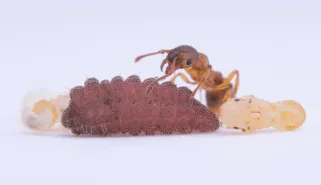When a cold takes away a person’s sense of smell, part of the brain that helps link odors with memory, emotion and reward works overtime in preparation for the return of air flow.
The way smell rebounds from a period of diminished sensory input distinguishes it from the other senses, researchers at the Northwestern University School of Medicine in Chicago report online August 12 in Nature Neuroscience.
Other senses tend to back off when their functions are restricted. When a person wears a patch over one eye, for example, the part of the brain devoted to processing information from that eye weakens while the part linked to the other eye grows stronger. The same is true for hearing and touch, such as when a person goes deaf in one ear or loses a finger.
To find out what happens to the olfactory system — the part of the brain that processes scents — when it’s completely odor deprived, Northwestern neuroscientist Joanna Keng Nei Wu and her colleagues set up a scent-free zone in a hospital’s research wing. Volunteers had to give up scented toiletries and spend a week with cotton stuffed up their nostrils to seal their noses off from the outside world. The researchers even took away the volunteers’ toothpaste, forcing them to brush with baking soda instead. Despite the hardships, it wasn’t difficult to find willing volunteers, Wu says. “We had a lot of medical students who wanted us to lock them up in the hospital for a week so they could study.”
After a week of scent deprivation, a part of the brain known as the olfactory cortex had generally lower activity that it did before the experiment. But not for long: The region’s activity bounced back to normal within a week of volunteers returning to their regular smell-filled worlds. That response is similar to how brain regions that deal with other senses behave.
But another region called the orbitofrontal cortex, which links odors with memory, seems to balance out the olfactory cortex’s reduced activity. Brain activity in the orbitofrontal cortex went up after a week of deprivation and then returned to predeprivation levels after a week of recovery time.
The balancing act isn’t perfect, Wu and her colleagues found. As the orbitofrontal cortex turns up the volume for scent processing, it also amplifies noise: After being deprived of odors for a week, people had more difficulty distinguishing minty scents from floral smells than they did before odor deprivation.
The results highlight how scrappy and resilient the olfactory system is, says Donald Wilson, a neurobiologist at New York University. “The system has adapted to this problem of ‘I’ve always got something in my nose,’ by saying, ‘Let’s not give up and let the other sensory systems take over.’”






